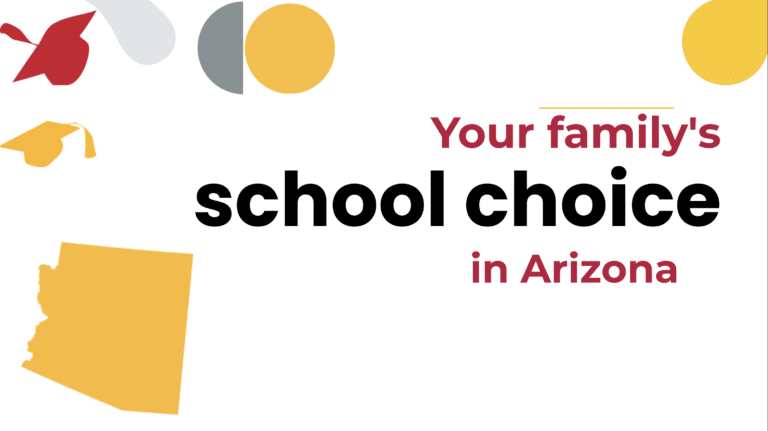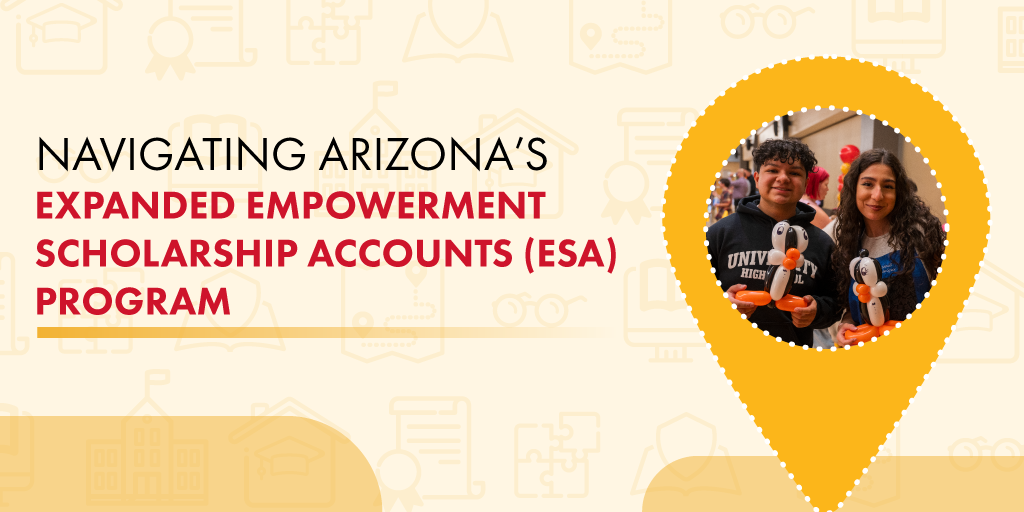Choosing a school? You’ve got options.
If you live in Arizona, you have access to more K-12 education options than you might realize. Navigating these options can help you find a school where your child thrives, but it can also feel overwhelming. This guide will breakdown the main types of school choice in Arizona, as well as provide additional education resources.
Arizona families can choose from traditional public schools, public charter schools, public magnet schools, private schools, online learning, homeschooling, and microschooling and mix-and-match learning.
Interested in learning more about Arizona’s ESA program? Check out our deep dive blog on the Empowerment Scholarship Account program and Arizona School Choice.

- Traditional Public Schools
- Public Charter Schools
- Public Magnet Schools
- Private Schools
- Online Schools
- Homeschool
- Microschooling
Arizona Traditional Public Schools
Most children in Arizona (68.3%) attend traditional public schools. Traditional public schools are free to attend, open to all students, operated by school districts, and funded by taxpayers like you. Arizona spends an average of $9,611 per public school pupil each year. You can search your school’s spending and that of nearby schools at Project Nickel.
Arizona has unrestricted open enrollment for public school. What this means is that you can send your child to any public school in Arizona, regardless of where you live or where the school is located, as long as the school has capacity. Each district’s open enrollment policies must be available in English and Spanish, and must include transportation provisions. These include transportation up to about 20 miles each way for students with a disability or IEP, and can include other students, too. For example, you can read about the open enrollment process in the Scottsdale Unified School District.
Arizona has a law prohibiting public schools from charging tuition for transfer students, so this option is always free. You can take advantage of open enrollment by visiting multiple public schools near you and discovering which is the best fit for your family. Traditional public schools may differ in learning methods and one may just “feel different” than another to you.
For example, one traditional public school in Arizona we talked to, Coyote Springs Elementary School, has a unique focus on “authenticity in learning.” Pamela Clark, the school’s instructional specialist, shared one of the school’s cool practices for the beginning of the school year. It’s called “two for ten.” She said, “We want everyone on campus to spend ten minutes with a child for a couple of weeks just getting to know them, talking about things other than school, and every person on campus participates, including teachers, custodians, the cafeteria staff.”
Find out more about public schools and Arizona School Choice at the Arizona Department of Education and Office of the Governor. You can also learn more about Arizona open enrollment in this 50-state report.
Arizona Charter Schools
Charter schools are tuition-free public schools that have extra freedom to innovate with curriculum and learning methods. Arizona has more than 500 charter schools that parents can choose from. In fact, at least 84% of Arizona students have access to at least one charter in their area.
Each school has a charter which explains the school’s purpose and what specific community need it serves. For example, Arizona Autism Charter School focuses on the educational needs of children with autism, while others may focus on language immersion or mathematics. If there are more families seeking admittance to a charter school than there are seats, a lottery system is usually used to determine admittance.
For more information on charter schools in your state, check out the Arizona Charter Schools Association. Families in the metro-Phoenix area may also be interested in Raising Arizona Kids’ annual guide to all nearby charters.
While some individual charter schools in Arizona provide transportation to students, the state does not require them to provide transportation for any students. However, students with special needs who have an Individualized Education Program (IEP) are eligible to receive transportation assistance.
We recently interviewed one of Arizona’s very first charter schools, Benjamin Franklin Charter School. When we asked the charter school’s Director of Education, Diana Dana, what makes her school unique, here’s what she shared: “Because we are not restricted by boundaries, we are able to welcome any family that is looking for something more than what their neighborhood school offers in a caring, wholesome environment. Many parents choose to be a part of something special with us because we provide an ‘A’ rated education and family-friendly amenities such as affordable before- and after- school childcare and free school supplies. We take pride in removing barriers to an excellent, tuition-free education.”
Arizona Magnet Schools
You can also choose magnet schools. These free public schools allow kids to narrow in on a specific learning track, such as health sciences or the performing arts. At a magnet school, all subjects are taught through the lenses of that specific track. These might be a good option if your kid learns best by focusing in on a subject he or she is passionate about!
There are many magnet school options in Arizona. For instance, the Tucson Unified School District in Arizona currently lists twelve magnet schools. These include schools that focus on communication arts, dual language, Montessori, and gifted study. Meanwhile, in Goodyear, Centerra Mirage STEM Academy is a magnet school focusing on hands-on STEM learning and enrichment. And, Gallego Primary K-3 Fine Arts Magnet School in the Sunnyside Unified School District focuses on art and creativity.
Arizona Private Schools
You probably know that private schools are nonpublic schools that charge tuition. But did you know that, since 2018, the federal government has allowed parents to save for K-12 private school tuition using tax-preferred 529 savings accounts?
There are more than 485 private schools across the state of Arizona. These private schools come in all shapes and forms, from religious schools to schools designed for children with special needs. Arizona’s Gateway Academy, for example, a private school located in Scottsdale, is providing an inspiring education for students with autism spectrum disorders.
The average tuition for private schools in Arizona is $9,619 for elementary schools and $13,766 for high schools. There are currently five state-run scholarship programs, which can help families afford private school tuition. One of these is the nation’s very first tax-credit scholarship program, enacted in 1997. All K-12 students interested in choosing private school are eligible to apply for aid. Arizona launched another individual income tax-credit scholarship program in 2012. Arizona also offers a tax-credit scholarship program focusing on scholarships for low-income children. Fourth, “Lexie’s Law” provides tax-credit scholarships for students with special needs.
Finally, Arizona has an Empowerment Scholarship Accounts program that was adapted in 2022 to expand eligibility to all Arizona students. Participating families can receive scholarships of about $7,000 or more for qualifying educational expenses, including private school tuition, online education, tutoring, transportation, and education therapy. As of 2024, 9.8% of Arizona students are participating in this popular program.
Learn more about Arizona School Choice at Choose A School Arizona, Love Your School, Phoenix Catholic Schools, Arizona School Choice Trust, Arizona Private Education Scholarship Fund, Inc., and Private School Review: Arizona.
Arizona Online Learning
Whether your child wants to accelerate learning or needs a quieter environment, you may be interested in trying virtual school. Arizona students can choose from many free, full-time online charter schools, including the state’s single largest online program, Primavera Online School. Other options include Arizona Virtual Academy, Arizona Connections Academy, Astravo Online Academy, Sequoia Choice Arizona Distance Learning, and ASU Prep Digital. High schoolers can also consider Khan World School, a creative partnership between ASU Prep Digital and Khan Academy. Students in high school can also consider Insight Academy of Arizona or Hope High School Online, both of which specialize in helping struggling students succeed. Students in grades K-8 can also consider Leman Virtual Academy or Great Hearts Online, both of which have classical learning focuses.
In order for funding to transfer to one of these schools, families switching to an online school may need to initiate withdrawal from their previous school. You can learn more about the online school community in your state at AZ Parents for Education.
Besides online charter schools, there are more than 100 districts in Arizona currently offering part-time or full-time online learning! These include the Mesa Distance Learning Program, Chandler Online Academy, Scottsdale Online Learning, Deer Valley’s Aspire Online Academy, Paradise Valley Online, and Casa Grande Union High School District Online Academy. The State Board of Education makes a complete list of district online programs and the grades they serve available to families.
To read more about online learning in Arizona, check out the Digital Learning Collaborative’s state profile.
Arizona Homeschooling
Homeschooling is another school option in all 50 states. Homeschooling is the process of parents educating students at home and allows for highly customizable education. 3.4% of all K-12 students are homeschooled. If you homeschool in Arizona, your student might still be eligible to participate in sports or classes at your local public school!
If you choose to homeschool, you are required to teach reading, grammar, math, social studies, and science, but specific standardized tests are not required. The state requires a one-time notice of your intent to homeschool within 30 days of beginning to homeschool in a county. It is also recommended that you formally withdraw from your previous school so that your student is not marked truant.
If you move to a new county during the school year, you must file a letter of termination, then submit a new notice of your intent to homeschool in the county you moved to. In the case that you want to switch back to public school, you must file a letter of termination.
Keep in mind that Arizona has a funding assistance program called the Empowerment Scholarship Account program that can help make homeschooling more affordable for families.
You can learn more about Arizona homeschooling at Arizona Families for Home Education or the Home School Legal Defense Association – Arizona.
Arizona Microschools and Mix-and-Match Learning:
Increasingly, Arizona families are mixing and matching school options to come up with new ways to personalize education. Microschools are one of these ways. A microschool refers to students gathering together in a small group – with adult supervision – to learn, explore, and socialize. Microschools can take a variety of shapes and legal forms, from homeschoolers coming together at an enrichment center to a private school committed to small classrooms. What microschools share in common is a commitment to small-group learning, close-knit relationships, and emphasizing children as individual learners.
Here are just a few examples of the many microschools and nontraditional learning choices for families in Arizona:
Arizona’s Empowerment Scholarship Account provides participating families with education funding that can be used flexibly for approved learning expenses, like private school tuition, home education, tutoring, and more.
Prenda Microschools offers tuition-free learning pod options for families through a partnership with accredited online schools in Arizona.
Endeavor Academy is a microschool situated in Mesa that follows an in-home approach to education.
Baker Creek Academy is a small, collaborative, student-driven school in Eagar that prioritizes community.
Based in Peoria, Integrative Learning Academy takes a multi-grade collaborative approach to learning.
Great Hearts Online has piloted a microschool program where families can enroll in the classical online school but receive in-person learning support.
Public online schools like ASU Prep and Sequoia Choice have launched learning-pod-like models where students work on their online school curriculum in person together a few days a week.
KaiPod Learning offers learning pods for both homeschoolers and students enrolled in accredited virtual schools.
Based in Phoenix, Spark Community Schools offers small classroom-style learning to grades K-8.
The Black Mothers Forum has launched at least five microschools in Arizona, specifically geared toward meeting the needs of minority communities and their families.
Adamo education combines in-person instruction in small microschooling environments with digital learning.
Primer is a microschooling network with schools in Scottsdale and South Tempe.
Kino School is an example of a small, innovative private school with mixed-age learning focused on student interests. While it’s been around since the 1970s, it shares some of the characteristics of microschools today.
iCubed Learning provides personalized learning pods for homeschoolers, online students, and those enrolled in hybrid programs, offering one-on-one teaching experiences with certified educators.
Trinity Arch Preparatory School for Boys offers a tailored learning pod environment focusing on a liberal arts education and character development in a Christian, boys-only setting.
Arizona State University offers a year-long fellowship that families can apply for if they’re interested in starting their own microschool.
Remember, microschooling is more a mentality than a specific legal distinction in most cases. Often, a family participates in a microschool while legally homeschooling, or being enrolled in a private or online school.
NSCAF gratefully acknowledges Mrs. Klein’s Pickle Co. for their donation in support of the 2024 school fair in Phoenix, Arizona
Search for Schools Near Me
Microschooling and Mix-and-Match Learning
How can it empower parents and help kids achieve their dreams?
7 Step Guide
Tips to help you find a school where your daughter or son will learn, succeed, and be happy.
Education Resources for
Arizona Parents
For additional information about Arizona School Choice, visit these resources:
Every state is different when it comes to school choice options.
Sign up below to get a detailed comparison:
"*" indicates required fields


